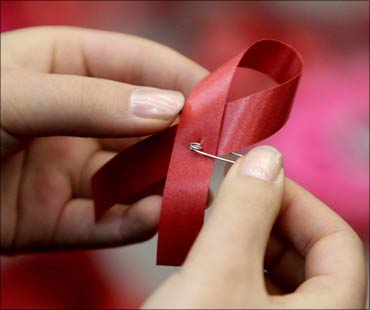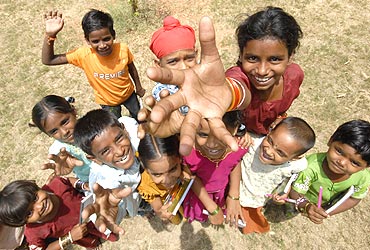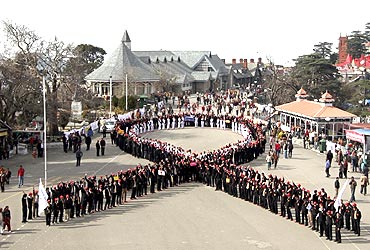Photographs: Reuters
India has rejected a drug patent application of a United States multinational pharma company, paving the way for easy access to an important life-saving medication for HIV patients across the globe.
The decision to reject the patent application on the important combination drug, Lopinavir/Ritonavir filed by Abbot Laboratories was given by the Indian patent office in New Delhi during the weekend and it is a major victory to millions of HIV-positive patients around the globe, according to NGOs working with affected patients.
The Indian Patents Office has put a halt to the multinational Abbott Laboratories patenting and said it was not an invention.
"India, the world's leading supplier of affordable medicines, can now supply this drug to patients across the globe who are desperately waiting for treatment. This combination drug is considered to be the frontline of defence for HIV positive patients who have failed to stay healthy with the first round of medicines available currently," Tahir M Amin, director of initiative for Medicines, Access & Knowledge (I-MAK), one of those who initiated legal action against the US company told PTI on Monday in a communication from New York.
. . .
Live saving move! India rejects Abbot's HIV drug patent
Photographs: Reuters
"This ground-breaking victory for patients sets an important precedent to stop pharmaceutical companies from gaming the patent system, marking a new era of hope for millions of HIV people across the world," Amin said.
I-MAK was one of the opponents from US and others were Indian pharma companies like Cipla (Mumbai), Matrix Laboratories (Secunderabad) and Okasa Pharmaceuticals (Mumbai).
This particular drug is critical to HIV patients who are failing first line treatment. However, not only has Abbott (the applicant for the patent) refused to license the drug, it is also refusing to match the lowest generic price when it comes to selling in countries like India, Brazil and China.
Abbott is also practising patent abuse as it has filed a number of applications in India covering various forms of the two drugs -- Lopinavir and Ritonavir.
. . .
Live saving move! India rejects Abbot's HIV drug patent
Photographs: Reuters
By doing so they are attempting to extend their monopoly for as long as possible under the guise of innovation and to keep at bay competition from Indian companies. Many of the patent applications cover the same technology with little modifications (in some cases none at all), but no therapeutic enhancement, Amin said.
The impact of the case is tremendous. There are over 33 million people living with HIV today and of these nearly 15 million require access to HIV drugs, he said.
Cost-savings generated over a three-year period by introducing generic Lopinavir/Ritonavir to 43 low and middle-income countries would be sufficient to start 1,30,000 new patients on HIV treatment who currently lack access. That is 130,000 lives that could be saved from opening up the market for this drug alone.
Cheaper generic versions of this drug are ready to reach patients in India and across the world. Most recently, the Clinton Health Access Initiative has negotiated a price of $440 per patient, per year for generic versions of this drug from four suppliers, he said.
. . .
Live saving move! India rejects Abbot's HIV drug patent
Enabling competition amongst Indian suppliers has been demonstrated to consistently drive down prices on HIV medicines, from $10,000 per patient per year in 2000, to as little as $79 today.
This affordable pricing by generic suppliers in India is in stark contrast to the unaffordable pricing by Abbott Laboratories on HIV drugs across the world over the last decade.
Abbott's track record on pricing this drug unfairly for poorer countries motivated us to take on this case, Amin stated in a release.
"They have gamed the patent system for nearly twenty years to extend the patent life on this drug. The time has come to say, 'enough is enough'," he added.
. . .
Live saving move! India rejects Abbot's HIV drug patent
Photographs: Reuters
I-MAK reports that Abbott Laboratories holds at least 75 patents on Lopinavir/Ritonavir alone. The rejection of this patent application in India was for a combination of existing drugs and techniques.
I-MAK, a non-profit organisation, is a team of lawyers and scientists increasing access to affordable medicines by making sure the patent system works.
"We work globally to ensure that patents do not act as a barrier to research and restrict the public access to
affordable medicines," Amin said.
Earlier, I-MAK has supported patient groups in India in filing against the Lopinavir and Ritonavir patents individually, as well as against the known soft-gel capsule of this drug combination. I-MAK has also challenged Abbott's patent in Europe.






article